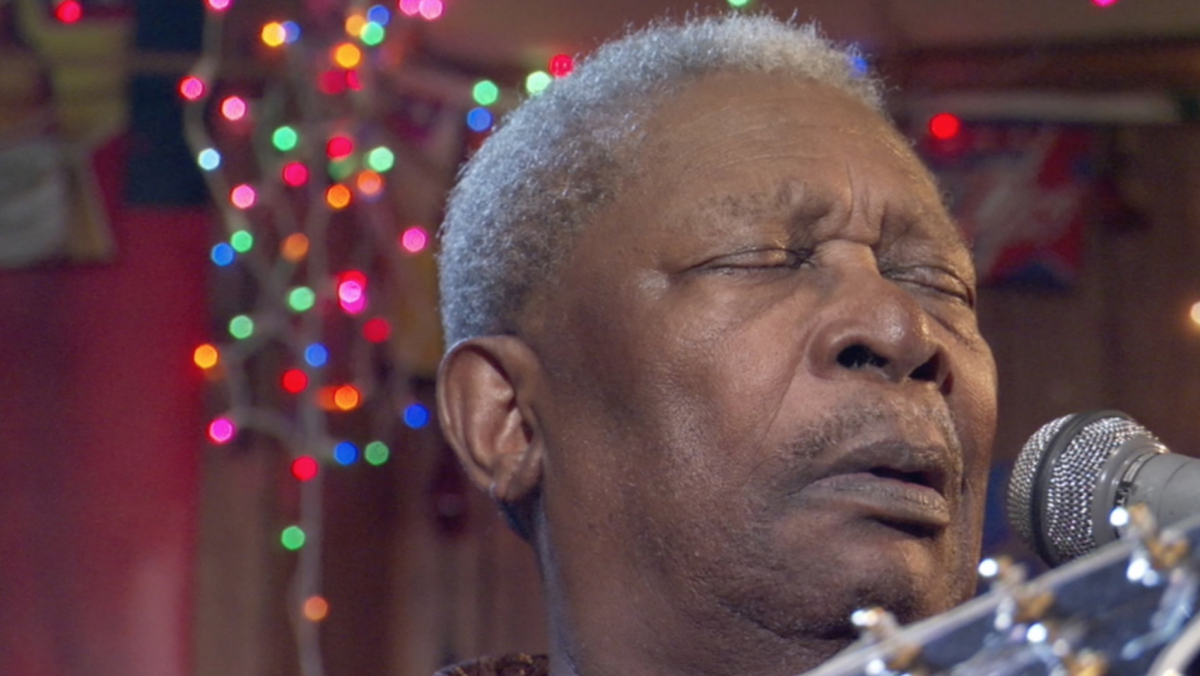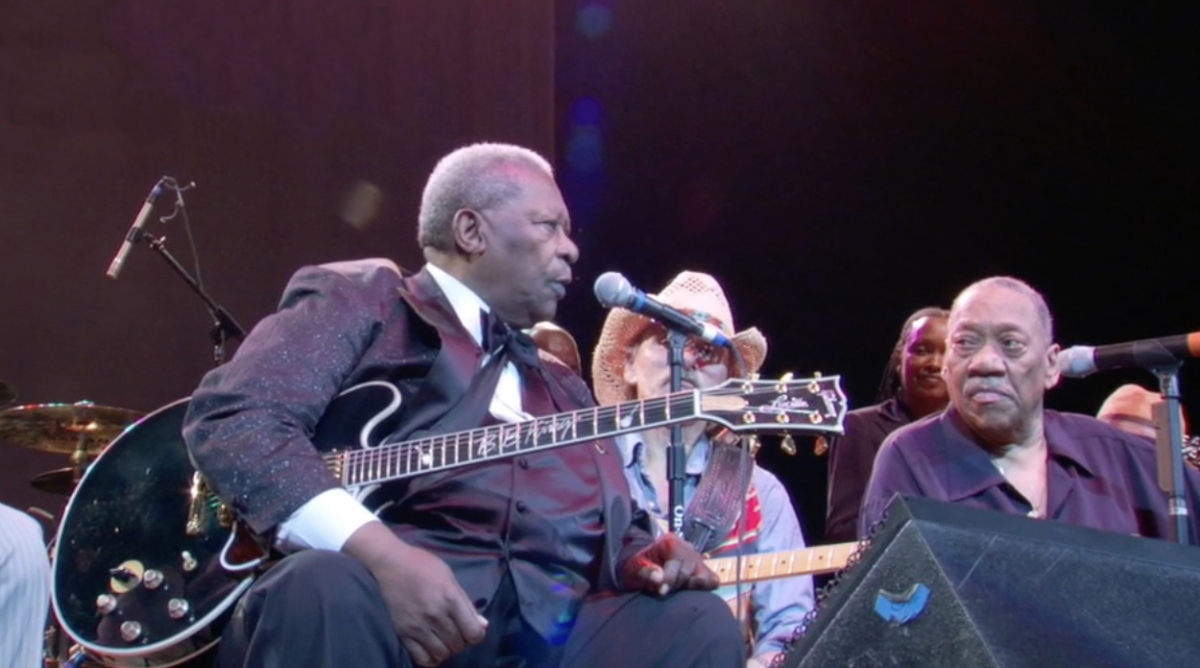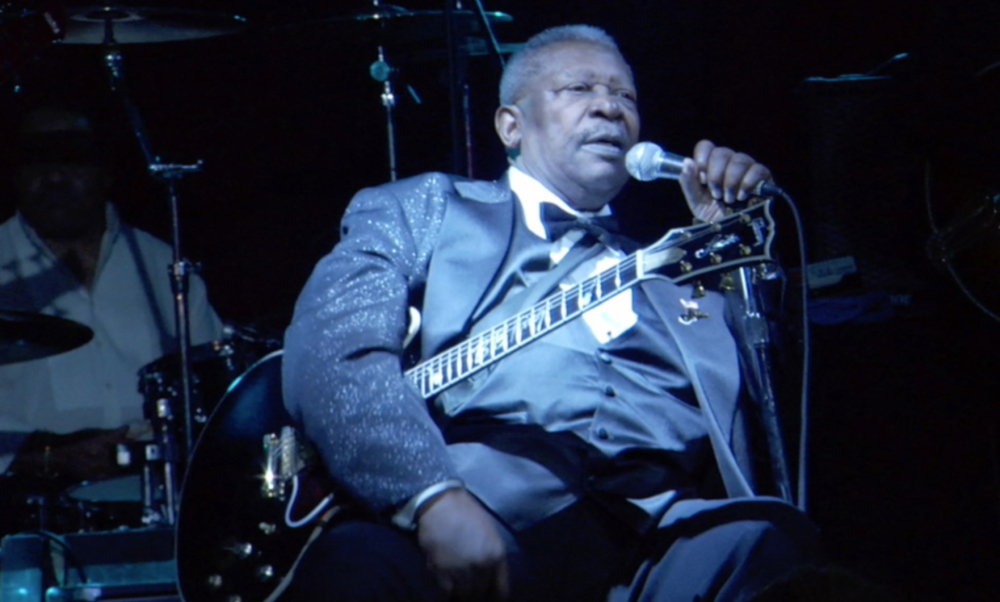This essay was produced in partnership with the B.B. King Museum and Delta Interpretive Center.
During his fifty-plus-year recording career B.B. King (1925 -2015) scored multiple hits, was the recipient of 15 Grammy awards, and was recognized with many awards including a National Heritage Fellowship in 1991. A premier showman and ambassador for the blues, King and his guitar “Lucille” influenced scores of musicians, and he was for many fans around the world the premier icon of the blues.
Slideshow of B.B. King performances selected and compiled by Robert Terrell of the B.B. King Museum and Delta Interpretive Center in Indianola, MS.
Riley B. King was born on September 16, 1925 in the tiny hamlet of Berclair in the Mississippi Delta, and spent the majority of his youth in the Hill Country to the east of the Delta flatlands. While living in the Kilmichael area he was inspired to take up the guitar by his pastor, Reverend Archie Fair, and he first listened to blues via 78 rpm records by artists including Blind Lemon Jefferson and Lonnie Johnson.
King became more active in music after he moved in his late teens to the Delta city of Indianola, where he played blues for tips on a street corner and was a member of The Famous St. John’s Gospel Singers, who had a weekly radio show in nearby Greenwood. In Indianola, King listened to local blues artists including Sonny Boy Williamson, but the main influences he credited as shaping his music were from outside the region who he encountered via records. The most notable of these were guitarists T-Bone Walker and Django Reinhardt and bandleaders Count Basie and Louis Jordan.
King’s achievements, goodwill, and perpetual advocacy for the blues were singular. It’s impossible to imagine the genre without his remarkable legacy.
In 1949 King moved to Memphis, where his career took off quickly. He was hired as a disc jockey on WDIA, which had just become the first station in the nation to feature all African American on-air personalities. His deejay name “The Beale Street Blues Boy” would later be shortened to B.B., and King’s affiliation with WDIA led to more live performances as well as a recording contract. In the wake of his huge 1952 hit “3 O’Clock Blues” on Los Angeles’s RPM Records he took to the road, beginning decades of over 300+ performances a year.
King filled his busy calendar playing on the “‘chitlin’ circuit,” the informal name for the national network of African American nightclubs during the segregation era, as well as at major theaters such as Chicago’s Regal Theater, where he recorded a popular live album in 1964. In the late 1960s King began experiencing crossover success, and his appeal to new audiences was sealed with his 1970 hit “The Thrill is Gone.” He was soon traveling across Europe, to Japan, multiple African nations, and the Soviet Union.
King’s new celebrity was expressed through appearances on popular TV programs such as the Tonight Show, and he also became a public advocate for social justice issues, including prison reform. On his recordings, King increasingly explored a wide range of styles and collaborated with stars from other genres (rock, contemporary R&B, jazz, country, and rap), most prominently U2 and Eric Clapton.

King received honorary doctorates from institutions including Tougaloo College and Yale University, and was hosted by dignitaries around the world—his numerous White House visits included a “duet” with President Obama.
A premier showman and ambassador for the blues, King and his guitar “Lucille” influenced scores of musicians, and he was for many fans around the world the premier icon of the blues.
King always remained dedicated to his home state, and beginning in the early 1970s took out time from his touring schedule for annual celebrations of the legacy of Civil Rights icon Medgar Evers. He would later return annually to Indianola for “homecoming” celebrations that included an outdoor show during the day and intimate performances at Club Ebony, a local venue where King had played since the 1950s. In 2008, King attended the opening of the B.B. King Museum and Delta Interpretive Center, a $15 million, state-of-the-art facility that uses King’s remarkable career to explore broader issues in African American culture and history.
King remained active as a performer and recording artist well into his 80s, and on May 14, 2015 his funereal celebrations included a procession down Beale Street, a formal police escort down Highway 61 to Indianola, and a burial on the grounds of the Museum. King’s achievements, goodwill, and perpetual advocacy for the blues were singular. It’s impossible to imagine the genre without his remarkable legacy.

To learn more about the National Endowment for the Arts (NEA) or to nominate a Mississippi traditional artist for a NEA National Heritage Fellowship, please visit their website.

